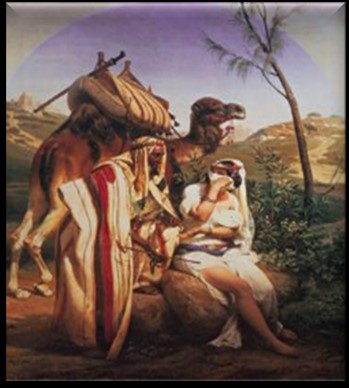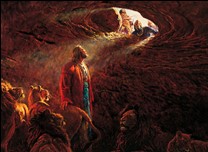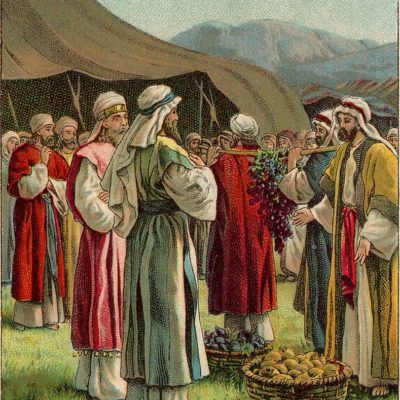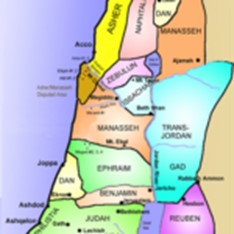Tamar Daughter in- Law of Judah

Tamar became the wife of the oldest son of Judah who was wicked in the sight of the LORD; and the LORD slew him. The second son of Judah, Onan, by Levirate Law was to marry Tamar and give her a child and raise it for Er. Onan refused and this angered the LORD God and he slew him. She did not handle being childless like the other Biblical woman in the Bible. Tamar took things into her own hand by entrapping Judah.
Genesis 38:1-30
Judah, the son of Jacob by Leah, went down from his brothers and turned in to a certain Adullamite, an inhabitant of Adullam whose name was Hirah. Hirah from Adullam was a friend of Judah who was the brother who sold his brother Joseph into slavery. (Genesis 37:26-27). Adullam was in the lowlands of Judah’s tribal territory (Joshua 15:35). It was one of 31 Canaanite royal cities conquered by Joshua. (Joshua 12:15).
Judah saw there a daughter of a certain Canaanite, whose name was Shuah; and he took her, and went in unto her. She conceived, and bare a son; and he called his name Er. She conceived again, and bare a son; and she called his name Onan. She yet again conceived, and bare a son; and called his name Shelah: and he was at Chezib, when she bare him. (Genesis 38:3-5).
Judah took a wife for Er his firstborn, whose name was Tamar. Er, Judah’s firstborn, was wicked in the sight of the LORD; and the LORD slew him. Judah said unto Onan, to marry Tamar and go into her and raise up the child to his brother. Onan knew that the seed should not be his. Onan went into Tamar, his brother’s wife but he spilled his seed on the ground so he would not give the seed to his dead brother. This displeased the LORD and He slew Onan. (Genesis 38:6-10).
Judah told Tamar his daughter in law, to remain a widow at her father’s house, till Shelah his third son grew up; unless he also died prematurely like his brothers did. And Tamar went and dwelt in her father’s house. (Genesis 38:11).
Shuah, the wife of Judah died; and Judah was comforted, and along with his friend, Hirah the Adullamite, went to Timnath to shear his sheep. It was told to Tamar that her father in-law had gone up to Timnath to shear his sheep. Timnath was a town in the hill country of Judah. (Genesis 38:12-13).
Tamar put off her widow’s garments, and covered her with a veil, and wrapped herself, and sat in an open place, which is by the way to Timnath; for she saw that Shelah, the youngest son of Judah, was grown, and she was not given unto him to wife. (Genesis 38:14-15).
When Judah saw her, he thought Tamar was a harlot; because she had covered her face. Judah asked for her to have sex with her because he did not know she was his daughter in-law. Tamar asked what Judah would give her. And Judah told her he would send her a kid from the flock. Tamar wanted some kind of a pledge or security, until he sent the kid from the flock. The pledge or security was suggested a signet seal, or signet-ring and his bracelets, and staff. He gave it to her and came into her, and she conceived by him. She arose, and went away, and laid by her veil from her, and put on the garments of her widowhood. (Genesis 38:15-19).
When the time came for Judah to send the kid by the hand of his friend the Adullamite, to receive his pledge from the woman’s hand: but he found her not. When he asked where the harlot was that worked openly by the wayside was, he found out there was no harlot in that place. He returned to Judah, and said he could not find her; and also, the men of the place said, that there was no harlot in this place. (Genesis 38:20-22).
Three months after the attempt to deliver the kid to the harlot Judah was told that Tamar his daughter in-law had played the harlot; and she was with child by her whoredom. Judah instructed them to bring Tamar and let her be burned. When she was brought forth Tamar told Judah she got pregnant by the man whose signet, and bracelets, and staff belonged. Judah acknowledged them, and said, she had been more righteous than he was; because he had not given Shelah to her. (Genesis 38:24-26).
And it came to pass in the time of her travail that is childbirth, that she had twins. One put out his hand; and the midwife took and bound his hand with a scarlet thread to say this one came out first. Then the first baby drew back his hand that, behold, his brother came out: this breach be upon you: therefore, his name was called Pharez. Then came his brother that had the scarlet thread upon his hand: and his name was called Zarah. (Genesis 38:27-30).
Levirate Law states: If brethren dwell together, and one of them die, and have no child, the wife of the dead shall not marry unto a stranger: her husband’s brother shall go in unto her, and take her to him to wife, and perform the duty of a husband’s brother unto her. And it shall be, that the firstborn which she bears shall succeed in the name of his brother which is dead, that his name be not put out of Israel. If the brother refuses to take his brother’s wife, then the wife must go up to the gate unto the elders and tell them the husband’s brother refuses to raise up unto his brother a name in Israel, he will not perform the duty of her husband’s brother. Then the elders of his city shall call him, and speak unto him: and if he stands to it, and say, I like not to take her; Then shall his brother’s wife come unto him in the presence of the elders, and loose his shoe from off his foot, and spit in his face, and shall answer and say, So, shall it be done unto that man that will not build up his brother’s house. And his name shall be called in Israel, the house of him that has his shoe loosed. When men strive or struggle together one with another, and the wife of the one draw near for to deliver her husband out of the hand of him that smites that is to strike, hit, beat, slay, kill him, and puts forth her hand, and takes him by the secrets: Then you shall cut off her hand, your eye shall not pity her. (Deuteronomy 25:5-12).
Tamar waited for Shelah, the third son to reach adulthood so that she can marry him. Judah did not follow the rules once Shelah became of age. Tamar probable felt that trickery was her only hope. The Levirate Law states that she has a right to a child from her husband being a part of the tribe of Judah. Onan, the younger brother of Er, was obliged to give Tamar a child. When he died then Judah promised his youngest child Shelah when he came to age. Judah failed in this obligation. Tamar took matters into her own hands instead of going to the gates of the elders.
Tamar asked for payment from Judah. He promised to send her a kid from his flock Tamar wanted some kind of a pledge or security, until he sent the kid from the flock. The pledge or security was suggested a signet seal, or signet-ring and his bracelets, and staff. A signet seal, or signet-ring and his bracelets, and staff were symbols of a man’s uniqueness, items of great personal worth, Judah had used a prostitute before and gave these treasures without question.
Judah told Tamar she had been more righteous than he was; because he had not given Shelah to her. She showed more loyal to the tribe of Judah than he was himself had. Judah broke the Law of Moses “Do not uncover the nakedness of your daughter-in-law” (Leviticus 18:10; 15) if a man lies with his daughter-in-law, both shall be put to death (Leviticus 20:12). Judah said Tamar was more righteous than he was but that really isn’t saying much.
Tamar is portrayed as being submissive and does what she is told. When her husband, Er, dies Judah passes her over to his second son, Onan. When the second son dies Judah tells to go to her father’s home and live as a widow until the third son is old enough to give her a child in the name of Er. It can easily be said that Tamar was passive until it came time to fulfil her duty toward the family of Judah and providing an heir for her dead husband, Er.
I am wondering if Tamar is as submissive and innocent as she is sometimes portrayed. There have been many examples of women in the Bible who have been childless. These women rely on the LORD God to open their wombs. Women like Sarah was ninety ears old and barren when the LORD God told her she would bear a son. (Genesis 17:17-19). Rachel who felt without a child she would die. (Genesis 30:1). Hannah would weep, and not eat her heart was grieved. (1 Samuel 1:5-15). Rebekah was barren and Isaac her husband begged the LORD God to allow his wife to conceive. (Genesis 25:21). These women were old and barren they prayed, wept, and prayed without ceasing for a child.
Tamar did not pray for a child there was no mention of her being in any distress over being childless. We know that Judah was in a bad place with the LORD God because he had just sold his brother Joseph into slavery. His oldest son was wicked in the sight of the LORD. The LORD God killed Judah’s second son because he refused to follow Levirate Law. Tamar entrapped Judah for purely reproductive reason. There was no praying, weeping or even asking the LORD for a child. The only good that came out of this story was Judah and Tamar had twins Perez and Zerah. It was through Perez that leads to the ancestry of David (Ruth 4:12, 18-22; 1 Chronicles 2:4) then to Jesus. (Matthew 1:3).
Cite Article Source
MLA Style Citation:
Holstein, Joanne “Tamar Daughter in- Law of Judah:.” Becker Bible Studies Library Feb 2015.< https://guidedbiblestudies.com/?p=2306,>.
APA Style Citation:
Holstein, Joanne (2015, February) “Tamar Daughter in- Law of Judah:” Becker Bible Studies Library. Retrieved from https://guidedbiblestudies.com/?p=2306,.
Chicago Style Citation:
Holstein, Joanne (2015) “Tamar Daughter in- Law of Judah:.” Becker Bible Studies Library (February), https://guidedbiblestudies.com/?p=2306, (accessed).


